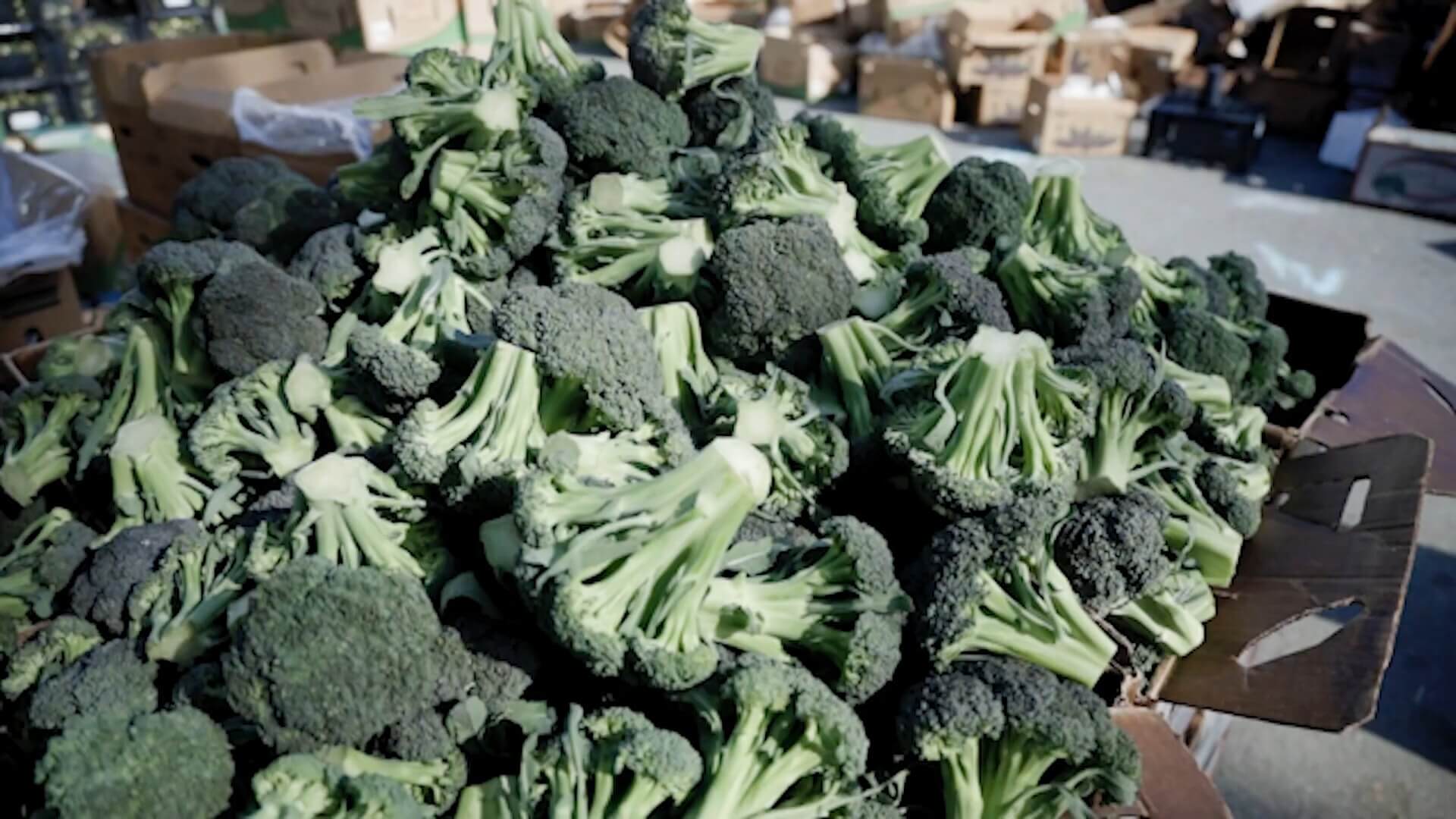
2021 - 2022
The Food Bank experienced and witnessed a community coming together in the face of inflation, rising grocery prices and declining government support. Together, with our partners, volunteers and supporters, we were able to provide nutritious, high-quality groceries to 53,000 households each week.
Our mission – to end hunger in San Francisco and Marin – remains stronger than ever. But it is also deeper than ever. It is not just providing food. It is partnering with, listening to, and amplifying the leadership of those with lived experience of hunger within our community to change policy, address the root causes of food insecurity, and continue to advocate for a future of choice, respect and growth.
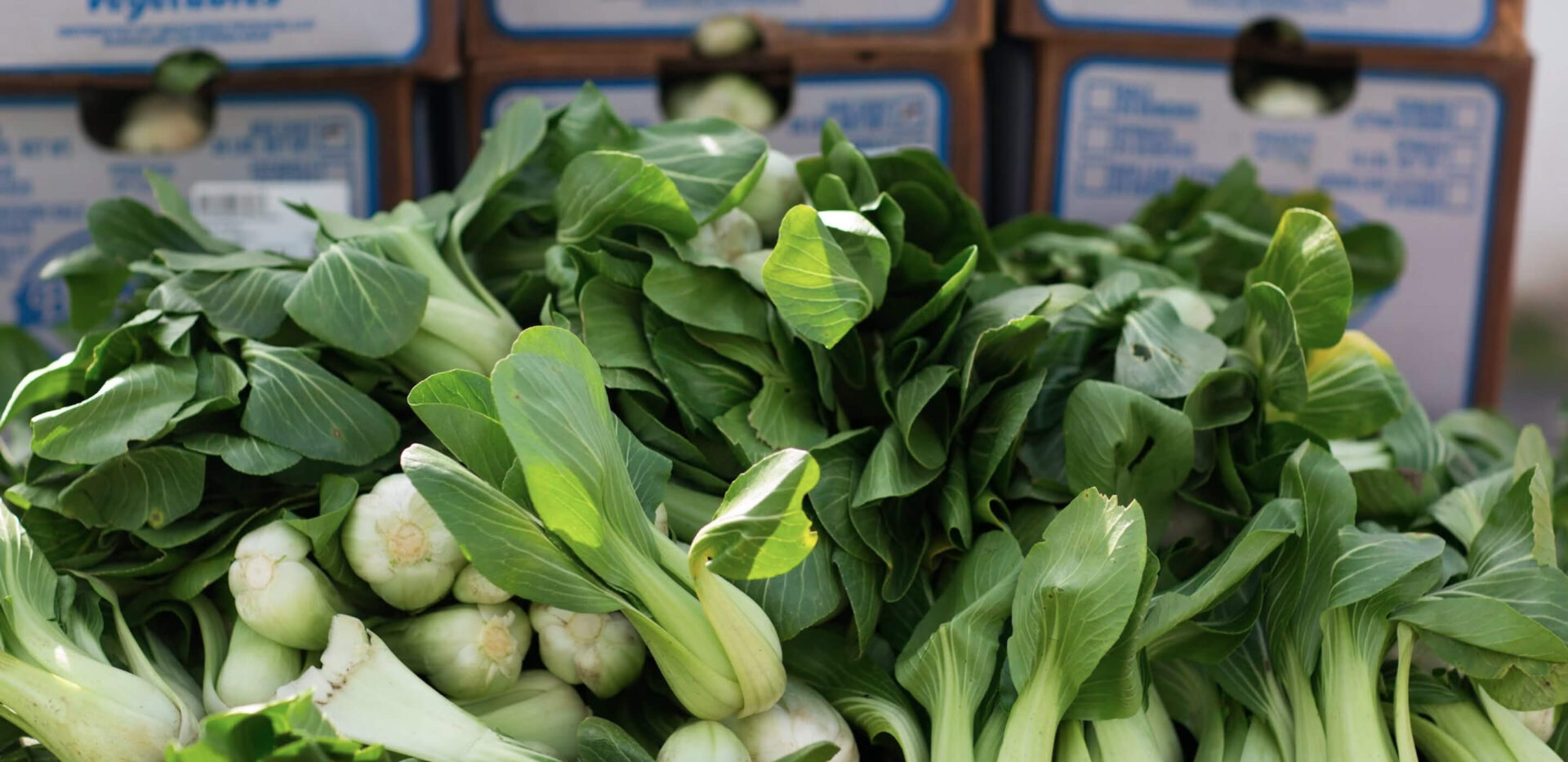
56,000,000
meals provided
53,000
households served every week
67,000,000
pounds of food distributed
$12,600,000
secured in CalFresh Benefits
4,000
neighbors assisted with CalFresh applications
Our Partner Network
350+
partnerships across San
Francisco and Marin
click to view:
Pantries
Non-Pantry Partners
Pop-ups
Home-Delivered Groceries
Key
Low
High

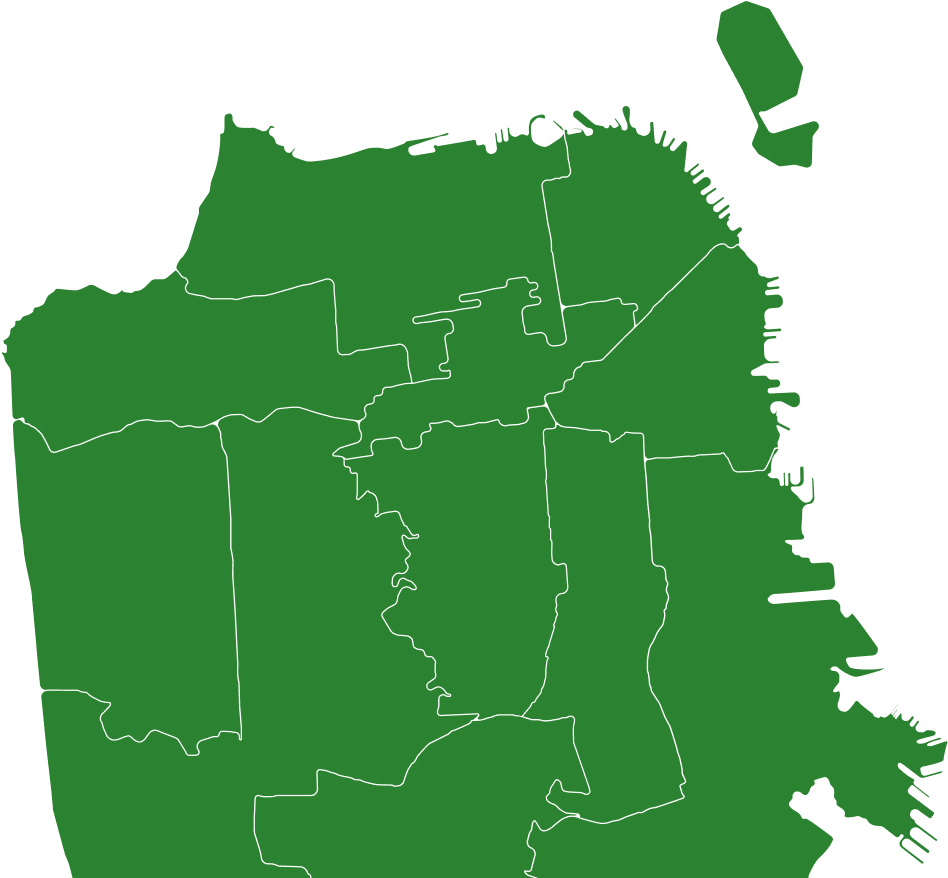



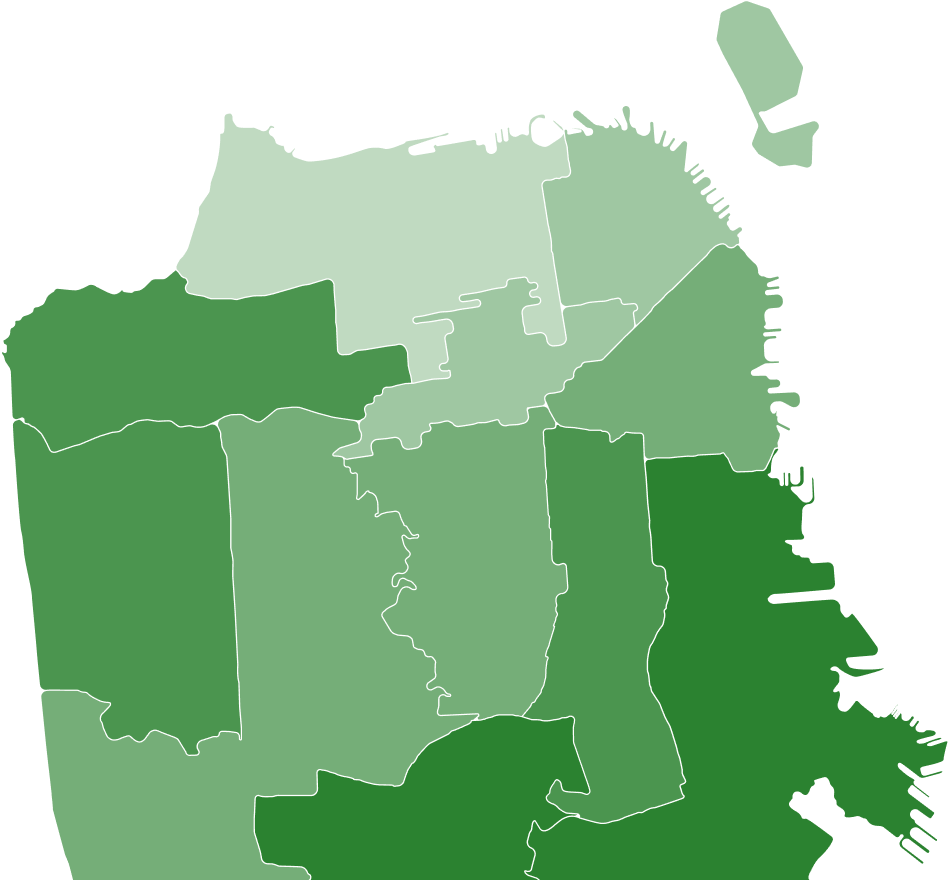
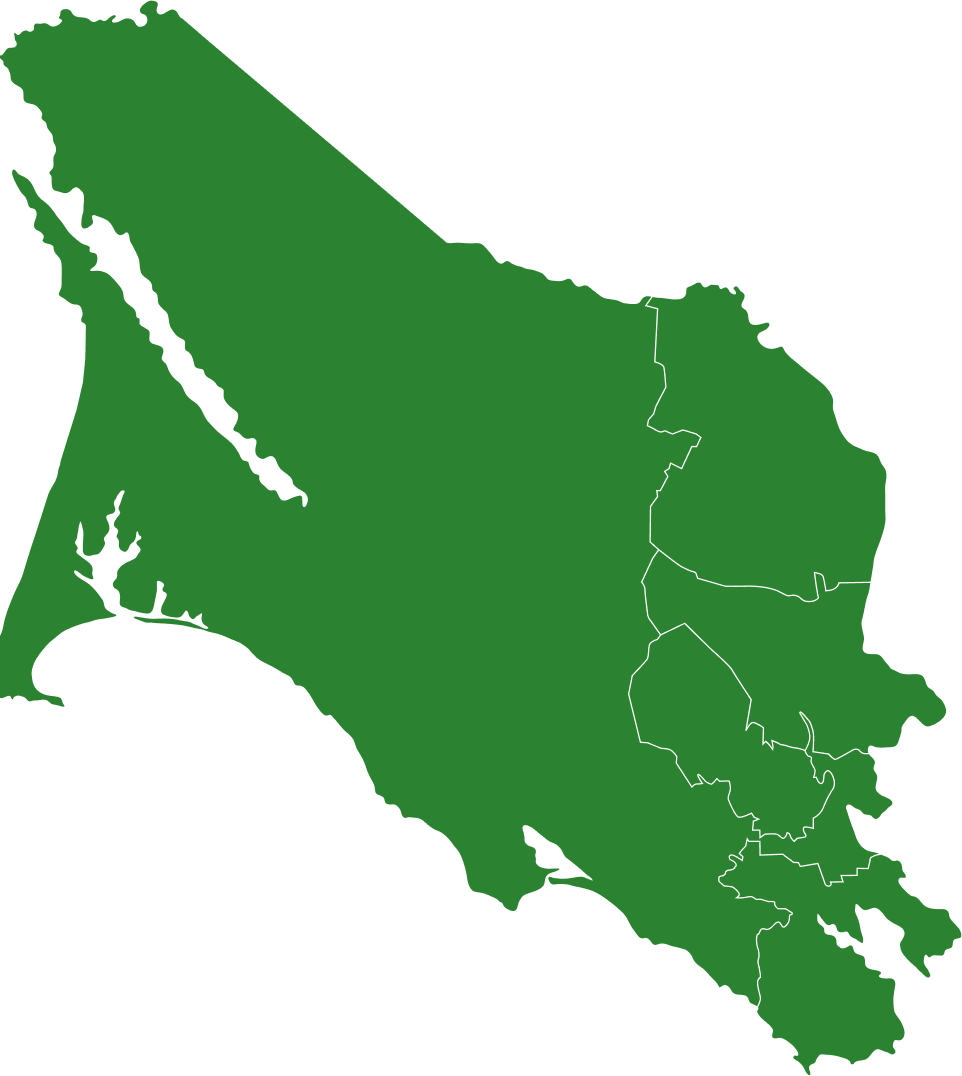



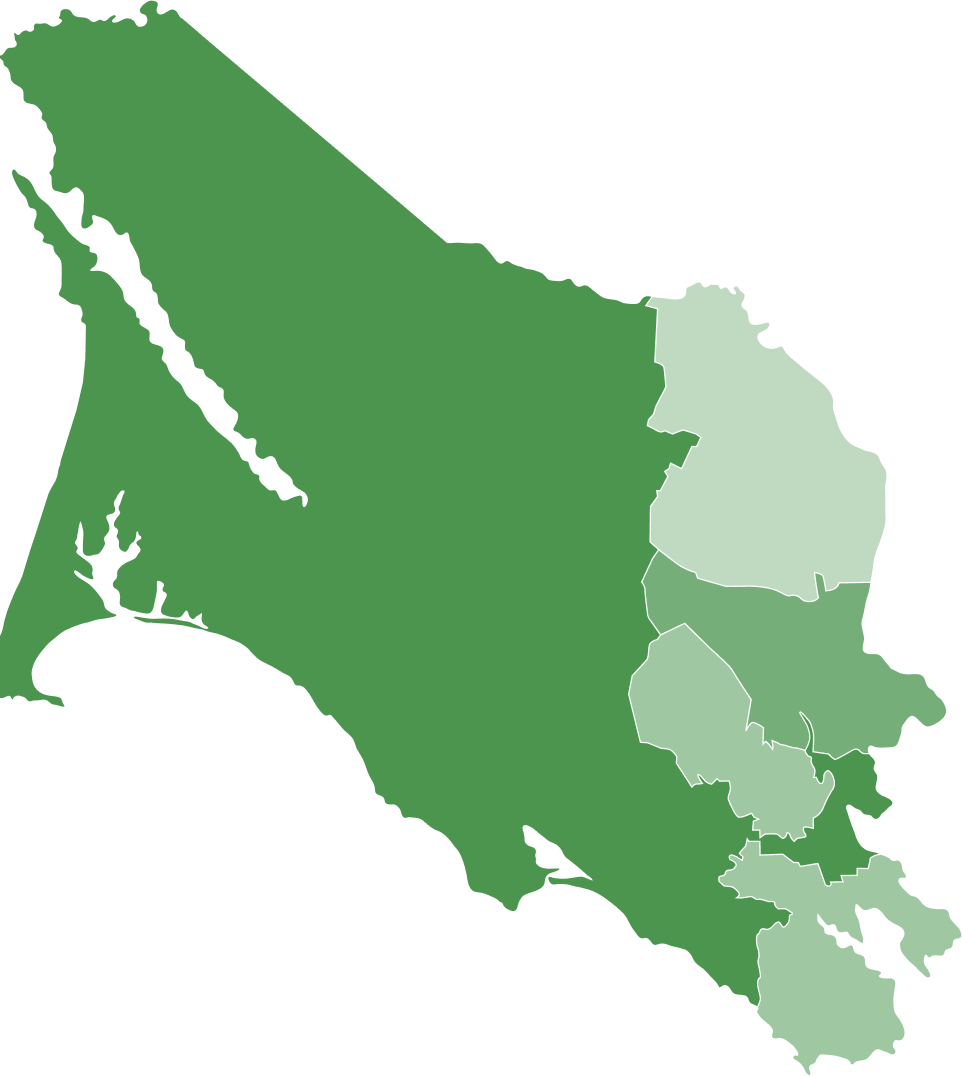
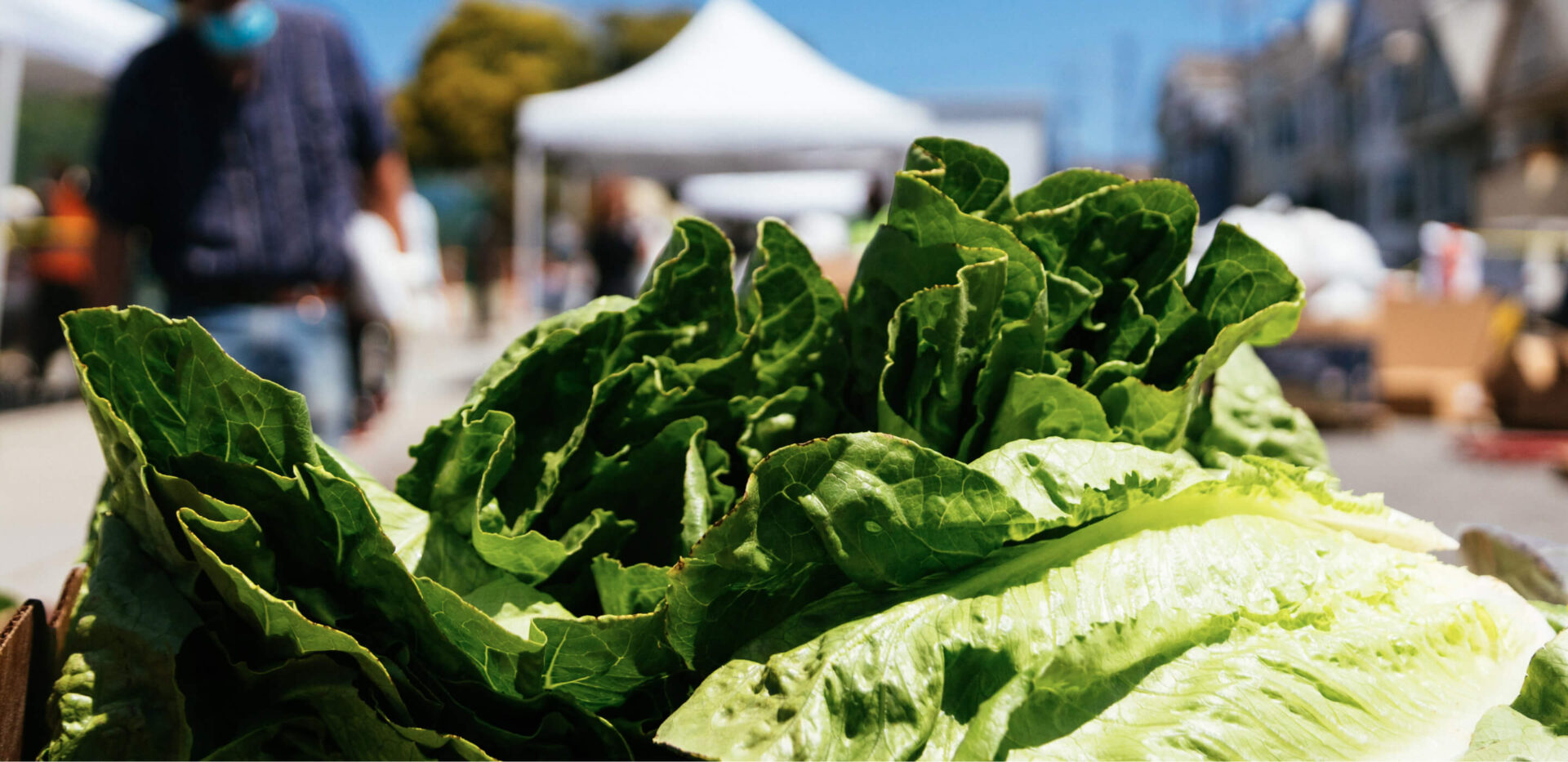
As we look towards the future, we envision a just and equitable society that nurtures a resilient community. Our shared hope is for a community where everyone will have access to nutritious food of their choosing and will be uplifted by a network of support.
Building on incredible partnerships over the past 12 months, we are excited about the year ahead. Join us in listening to and learning from the community voices and partners we connected with this past year.
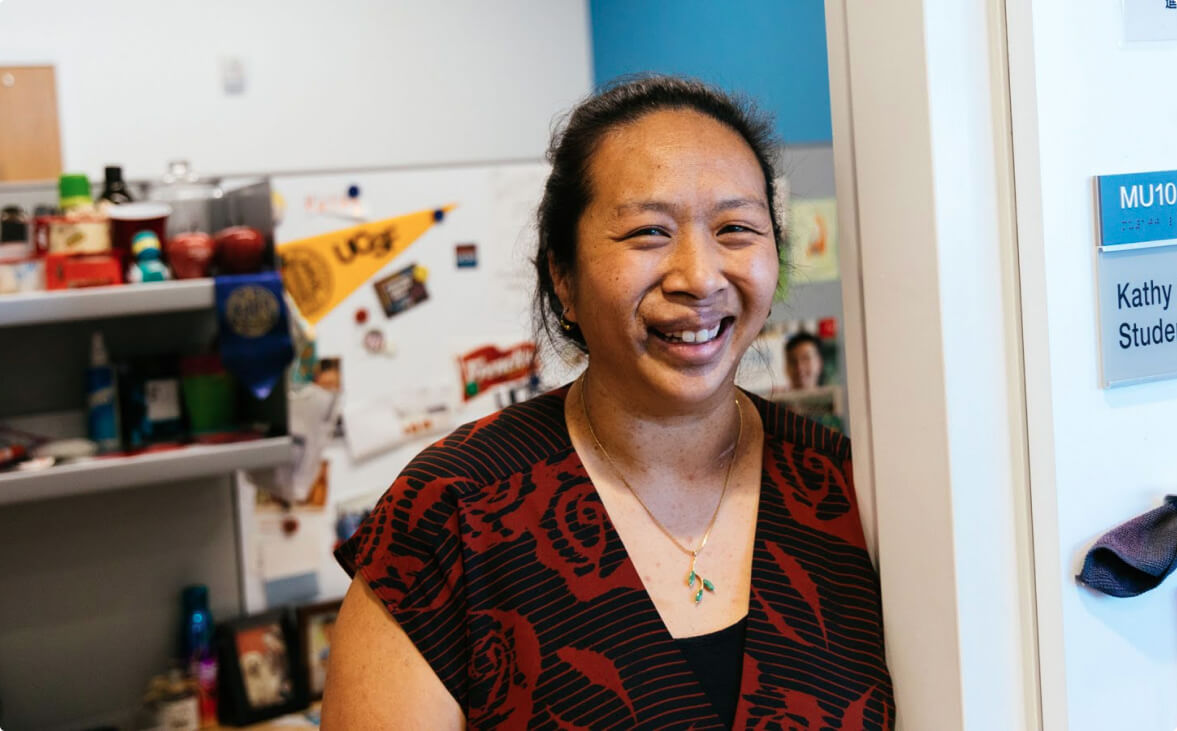
“The food pantry at UCSF is open to students and serves anywhere from 200 to 400 participants per week. During the pandemic, we were pre-bagging groceries to keep everyone safe. But what we found from listening to the students was that they have particular food desires. So, in April we worked with the Food Bank to transition to a farmer’s market style food program, where participants can choose which foods and how much they receive from our offerings.
It extends the time that we can spend with them – if they see a food like an eggplant and don’t know how to cook it, they can say, ‘What’s that? How do you use it?’ And we can tell them, you dice it up, stir fry it, bake it – give them suggestions rather than just send them on their way. What we found is that overall, working with the community reduces food waste and increases participant satisfaction, which is great for everyone!”
― Kathy Chew, Program Coordinator, UCSFThere are 250 Neighborhood
Pantries in our network
We offer our participants 86
different types of fruits and vegetables
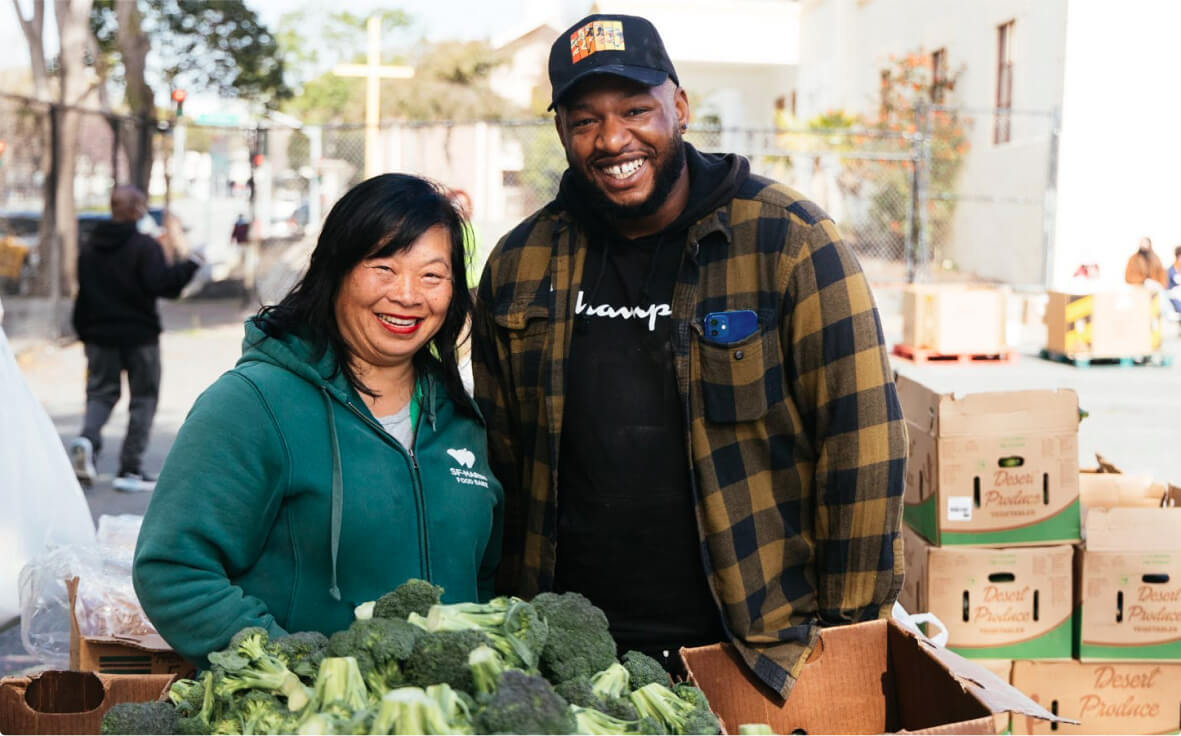
“It gives people dignity when they're offered foods that are relevant to them and a part of their culture or diet. I really enjoyed observing participants enthusiastically choosing items such as black pepper, green onions and avocados. These are foods that span across cultures.”
― Angela Lan, Community Support Coordinator, San Francisco-Marin Food Bank"The Culturally Relevant Options (CROps) pilot supported participants who are facing food insecurity by providing items that are familiar, nutritious, and comforting.
People told us that these foods made them more confident in cooking and utilizing all the groceries provided. Once I heard a participant say, ‘Wow! I feel seen.’ Feedback like this reminds us that some marginalized communities feel invisible at times. Culturally relevant foods can let someone know: you are visible.
Months after launching this pilot, people still eagerly share their cultural knowledge, cooking methods, and gratitude with us for acknowledging their cultural complexities via our menu.”
60% of what we distribute is fresh produce
27 Pop-up Pantries run by the Food Bank
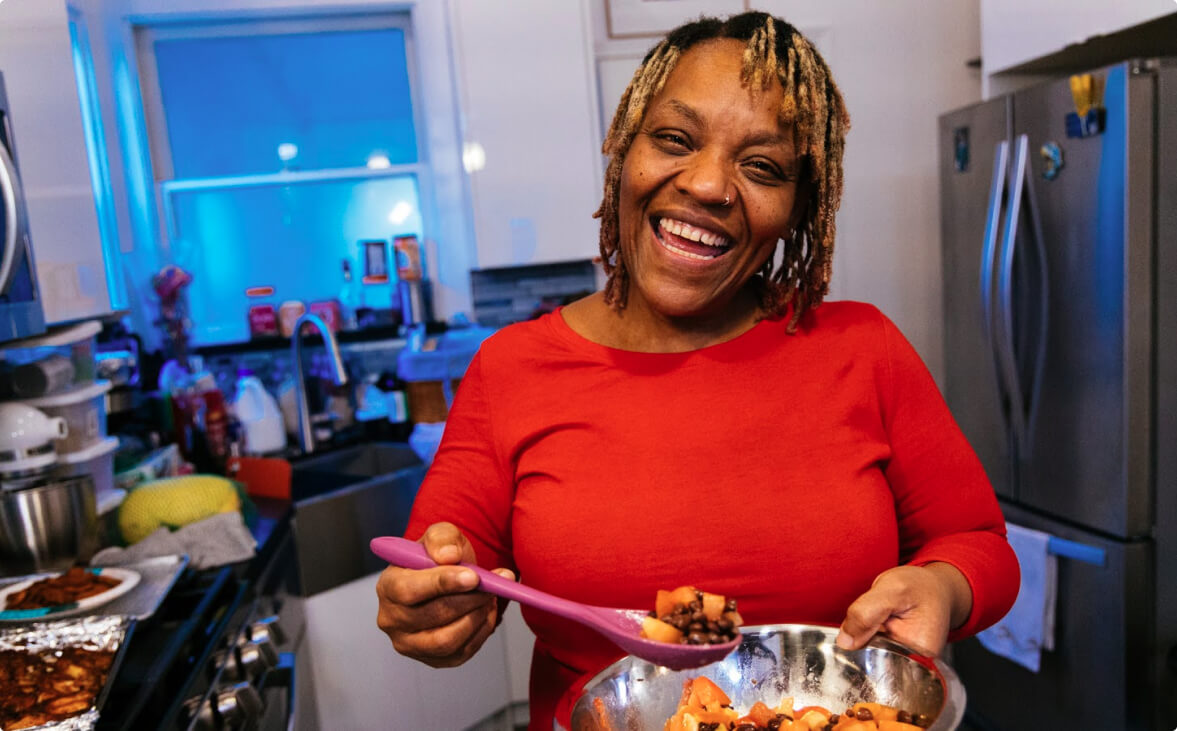
“There's a great benefit to using the Food Bank for people such as myself. I look forward to the Food Bank delivery because of the ladies that drop off the groceries. Mentally, it brings light to the fact that there are people out there who do care. I'm not fighting this battle on my own. Due to health issues, I am on a very restrictive diet. Today, I used the oranges I got from the Food Bank, along with the spinach and cauliflower and made a salad.
It's thinking outside the box, but also thinking about what my body needs. I could write a full cookbook with just the Food Bank stuff. There’s not a vegetable or fruit that's foreign to me anymore.“
― Marie, mother and grandmother, nonprofit founder, and Home-Delivered Groceries ParticipantWe home-delivered groceries directly to nearly 12,000 seniors, people
with disabilities, and families with young children every week
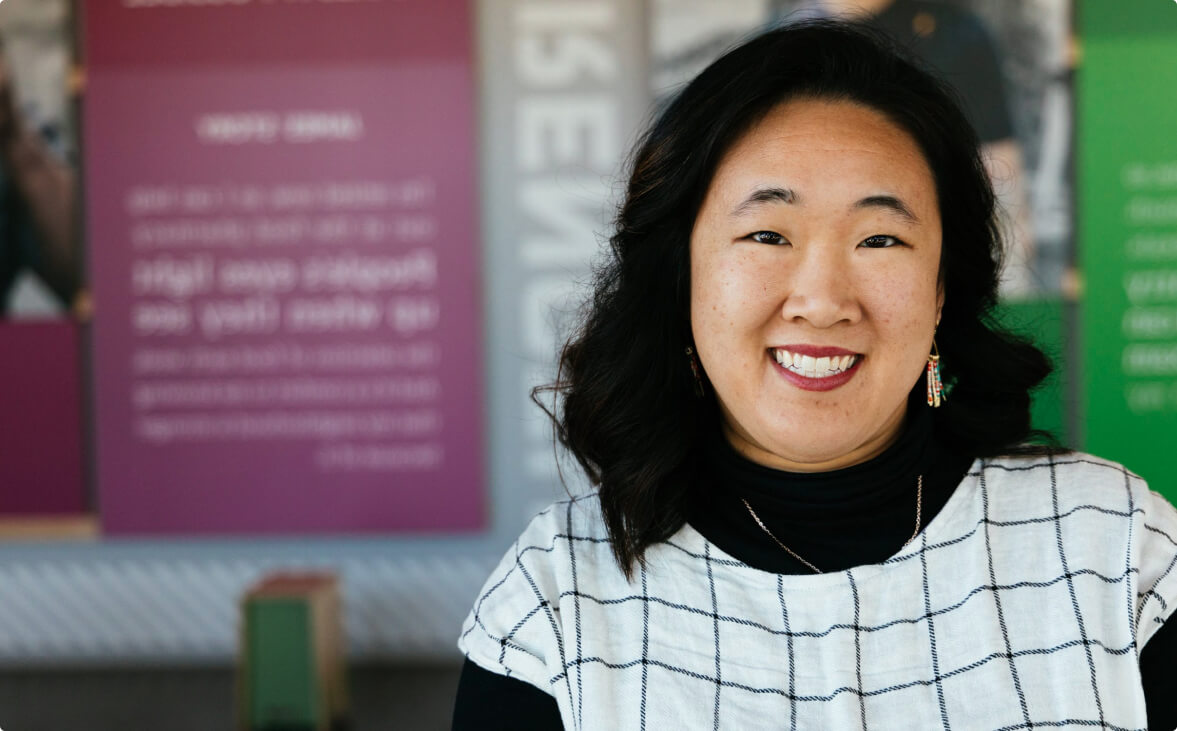
Our Hotline serves all participants at the Food Bank, including folks receiving Home-Delivered Groceries, those that pick up food at Neighborhood Food Pantries, and people interested in signing up for CalFresh (formerly known as food stamps). The Hotline also receives text messages, which makes it even easier for participants to access our services. It's a one-stop shop: people can check on the status of a grocery delivery, update their information, and provide feedback on what they receive, which then informs our Food Sourcing team on what kind of food our community is interested in.
For example, we learned that eggs are a really popular item, and now we’re serving eggs more often to our Home-Delivered Groceries participants. The Hotline is one way we gather feedback and create solutions in conversation with the community, and it makes accessing Food Bank services a better experience for participants.”
― Jillian Tse, Participant Support Manager, San Francisco-Marin Food BankOur Call Center Hotline helped more than 65,235
callers find the food assistance right for them
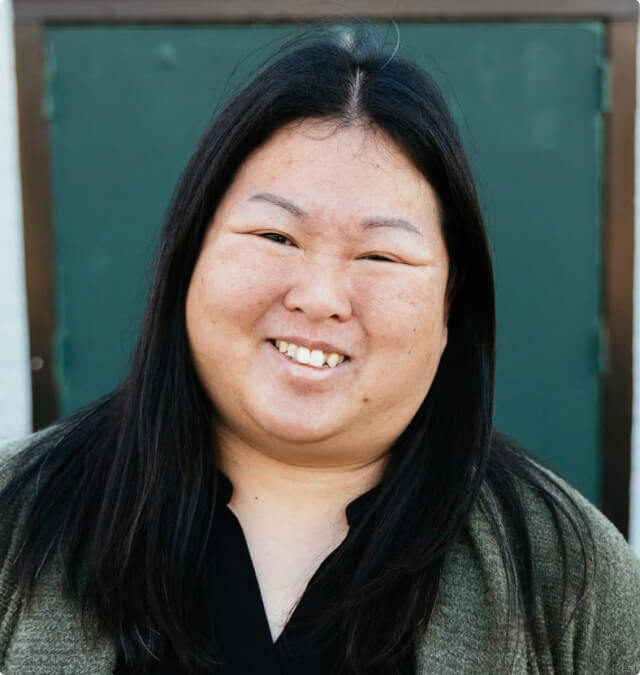
“Having shelf-stable product readily available for seniors helps people stretch their dollars. They'll save some of the food and then when months are tight, they can go to the cupboard and still have some SFP [Supplemental Food Program] product readily available.
A lot of our items are easy to use and don't require much cooking. So that’s important for seniors: being able to make spaghetti in 10 minutes is helpful. And then if you also supplement with fresh foods, you have a more complete meal.
For a lot of people, we might be one of their first real interactions of the month. So, our goal is, they leave feeling like they got good food and a good experience.”
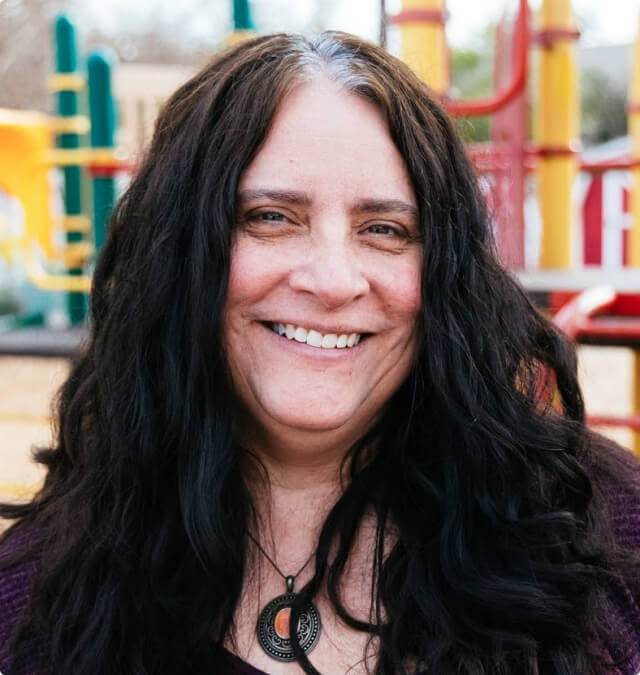
“At Community Action Marin, we value that food is a basic human right and must be accessible to everyone in our community. Some families are faced with the decision of paying rent or putting food on the table. Programs like CalFresh help parents provide healthy food for their families.
Food justice is at the forefront of what we do. We make sure that families are informed about CalFresh, all the different Food Bank distribution locations, and local pantries. We also make sure that not just the families and other clients we serve know about CalFresh – we want the general public to know about this benefit.
Our long-standing partnership with the San Francisco-Marin Food Bank prompted us to train our Success Coach staff to become CalFresh Assisters. I can proudly say we have 26 Success Coaches from across our different programs trained to assist clients with applying for CalFresh!”
9,000+ Seniors received a
supplemental food box
Completed 4,000 CalFresh
applications and recertifications
Secured $12.6 million
in CalFresh benefits for participants
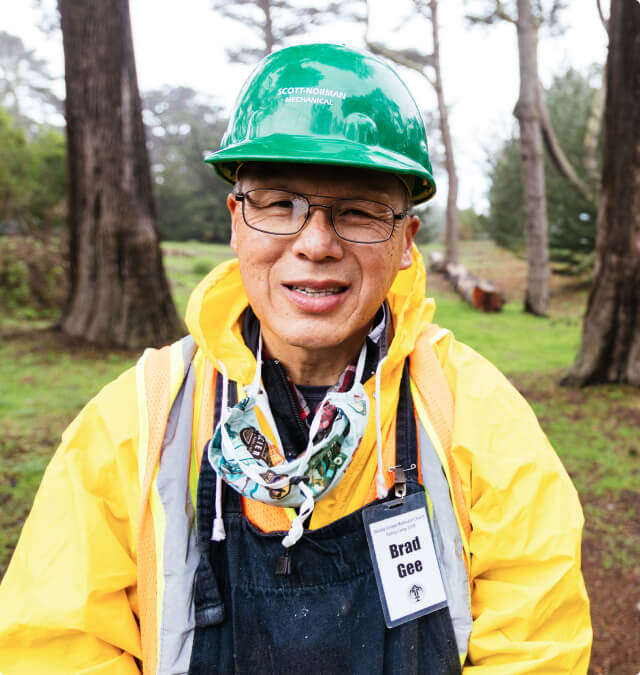
“I’ve been retired for seven years. I worked as a registered nurse at the VA Medical Center. In 2020, I was sworn in with the Department of Public Health. My wife and I volunteered a lot at the city-run mass COVID testing sites, and we worked as a mobile vaccine team. When they hired travel nurses, I started volunteering at the Food Bank.
I’m out at Pop-ups three times a week, and my favorite part of it is getting to work with people. I do childcare for my grandchildren, so without the Pop-ups, it's just little kids that I would socialize with – and I know I need to socialize with adults, too.
I took food for granted sometimes – it was never a problem for me. But I understand that it is a problem now. Even if COVID goes away, hunger won’t. So, I want to be part of the answer, and not part of the problem.”
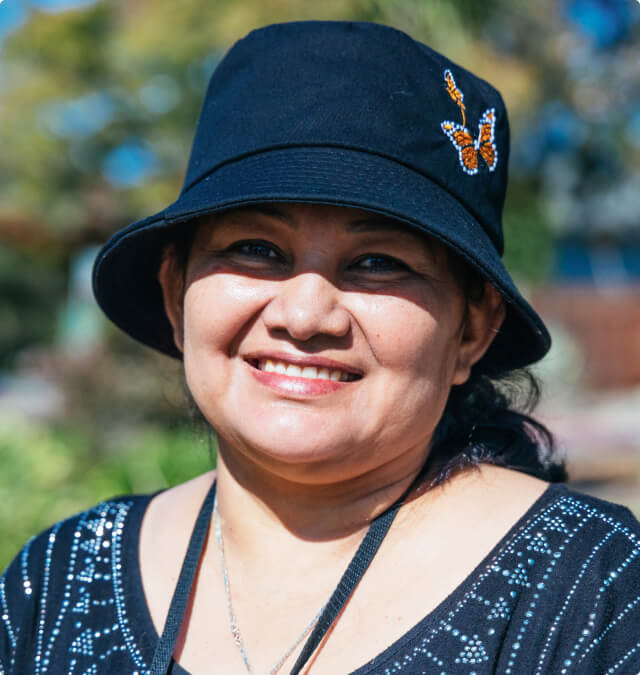
“I’ve been able to meet other people through volunteering, and they are all just friendly, happy people. So, I want to continue volunteering – it puts me in a good mood when I’m able to help out.
But it was a lot of work, going around in circles and filling up the bags. Now, with the farmer’s market style pantry, I think it’s a good system and it works well for us: volunteers don’t have to go in so many circles, and we can still help people with their groceries.
For me, the food that is given out here is great. This is all the food my family eats on a regular basis, so I can cover the basics for my kids. Instead of worrying about not having food to eat, I’m thinking about what I’m going to cook.”
56,000+ volunteers put in more than 144,000
hours of work, equivalent to 69 full-time staff
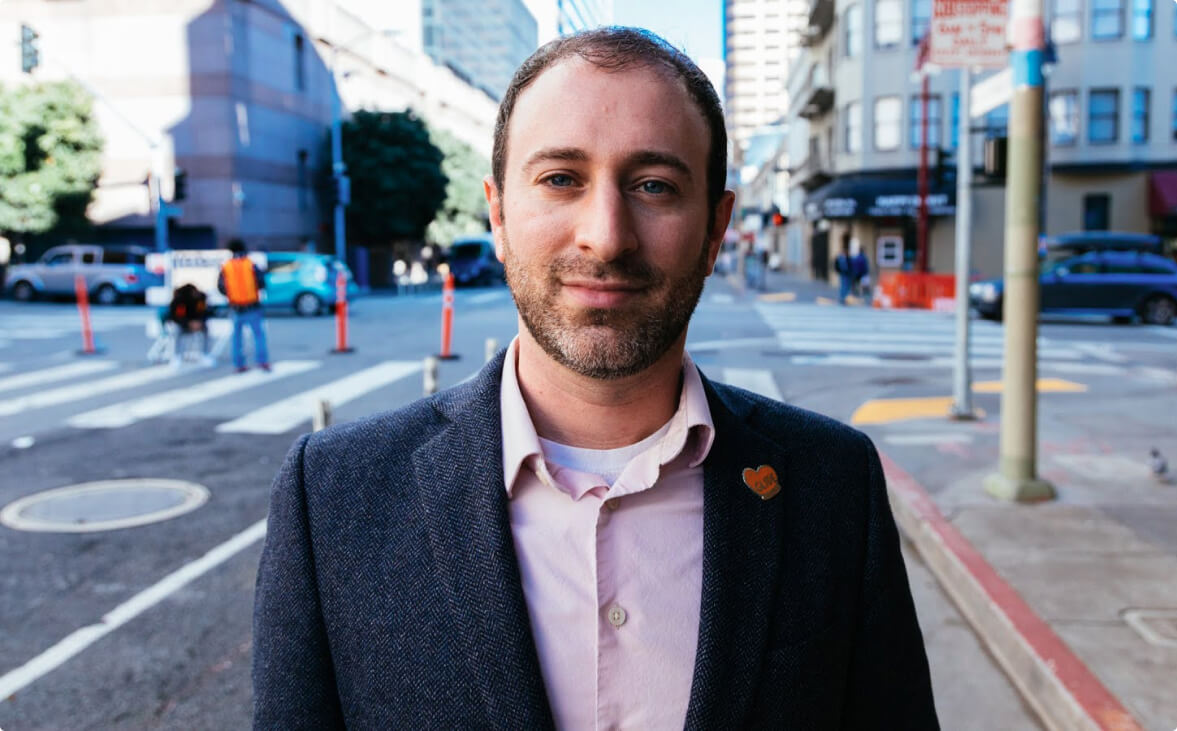
"Working in collaboration with community partners and broader stakeholder groups is crucial to enacting systemic change and addressing issues like hunger and the underlying causes of poverty. Intentional and inclusive organizing that centers the voices of impacted communities and leverages the strengths and resources of organizations with a shared sense of values can yield tremendous dividends for people who have been ignored, oppressed, and marginalized.
Members of the California Hunger Action Coalition — including GLIDE, the San Francisco-Marin Food Bank, and other providers statewide — contributed to historic food security investments this past year.
These investments included programs that feed children, students, seniors, immigrants, and families, and changes to government policies and decisions that bring equity to our nutrition safety net and broader food systems. This coalition truly understands that advocacy is most effective when people are empowered to confidently speak their truth and share their own first-hand experiences.”
― Wes Saver, Senior Policy Manager, GLIDEPartnered with a coalition of 25 community-based organizations
to secure investment in local anti-hunger programs
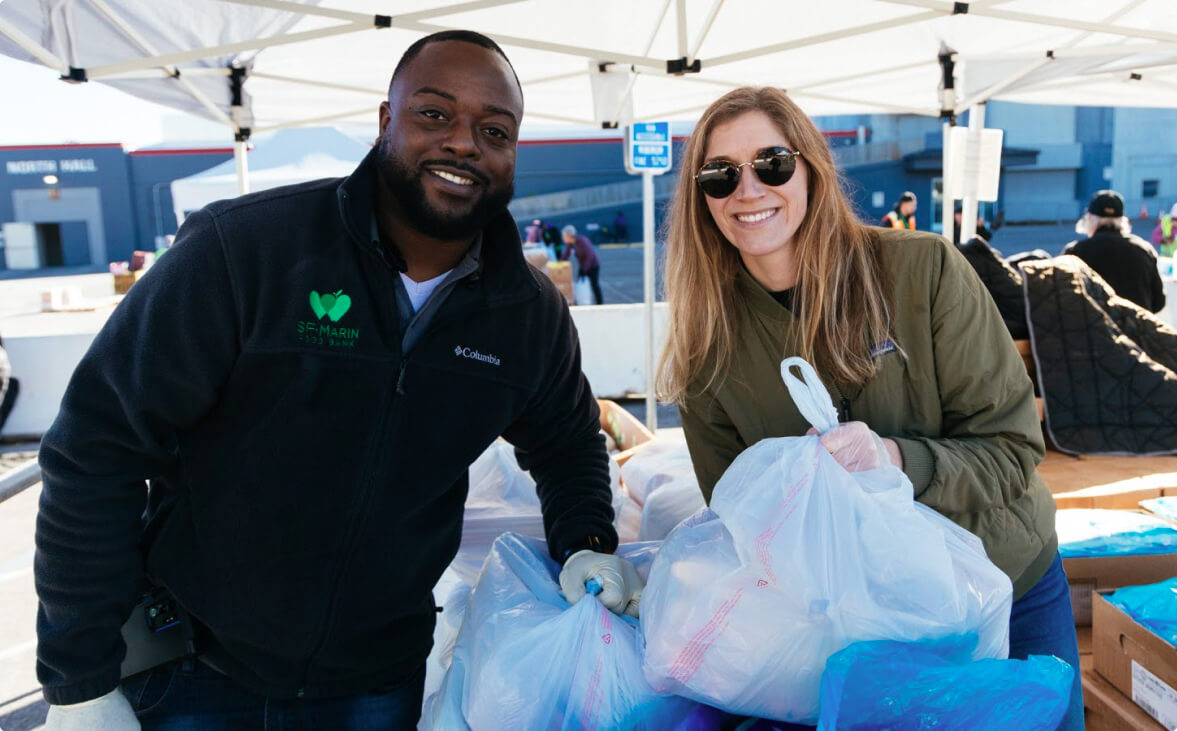
"Our advocacy efforts were born out of an original charge years ago to increase access to CalFresh in San Francisco and Marin counties. Today, our work has expanded to help strengthen the overall social safety net and advocate for greater public investments at the local, state, and national levels. We cannot end hunger without addressing its root causes – the systems and structures that created the hunger crisis.”
― Marchon Tatmon, Senior Government Affairs Manager, San Francisco-Marin Food Bank“This past year we saw continued progress through our coalition and partnership efforts. Through the Food4All coalition, we helped ensure all California residents over the age of 55 became eligible for food assistance, regardless of immigration status. Our advocacy contributed to securing the largest ever state investment in food banks to buy California-grown food. Partnering with local community-based food providers, we helped to reverse budget reductions for anti-hunger programming throughout San Francisco. These collaborative efforts to address food insecurity are fundamental to ensuring thousands of our neighbors have enough to eat. We can't allow hunger to continue in the communities we serve; that is just unacceptable."
― Meg Davidson, Director of Policy and Advocacy, San Francisco-Marin Food BankHosted 2 community listening sessions to ensure community
voices informed the national strategy on hunger and nutrition
Invited 17 elected officials from all levels of government to
volunteer and engage with their constituents facing hunger
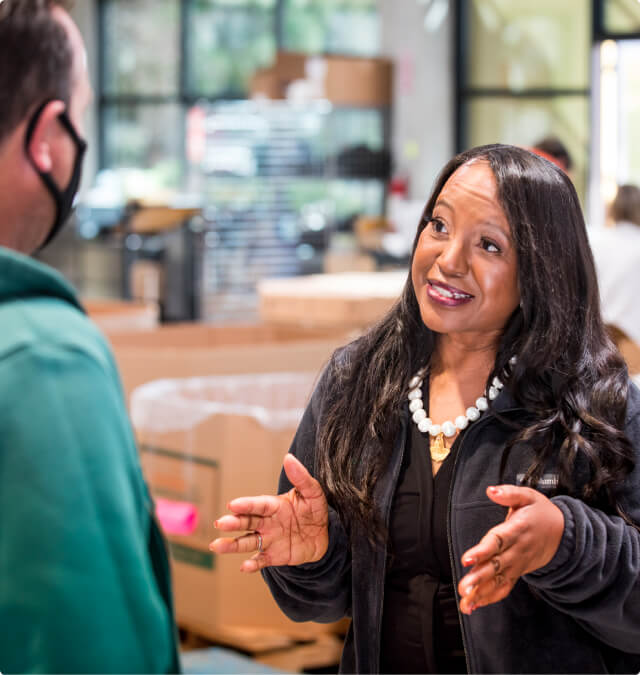
"I believe creating an environment where everyone, especially staff identifying as Black, Indigenous, and People of Color, can bring their authentic selves to work is critical. That’s why we’re building a workplace that supports well-being, is fair, and meets people where they're at. Since joining the Food Bank, I've been inspired to see how staff engagement, partnership and advocacy has helped create a more just, equitable, and people-centered organization. Our team created a cross-functional Justice, Equity, Diversity, and Inclusion council that doesn't pay lip service to diversity and inclusion issues but actively works to realize our goal of being an anti-racist organization. As a result of feedback, we reevaluated compensation across the organization, and implemented new initiatives to advance internal equity. Looking to the future, we'll continue to invest in our staff's personal and professional well-being, so our operations and people thrive. This is fundamental to advancing our mission."
― S. Jamila Buckner, Chief People Officer, Equity and Inclusion, San Francisco-Marin Food Bank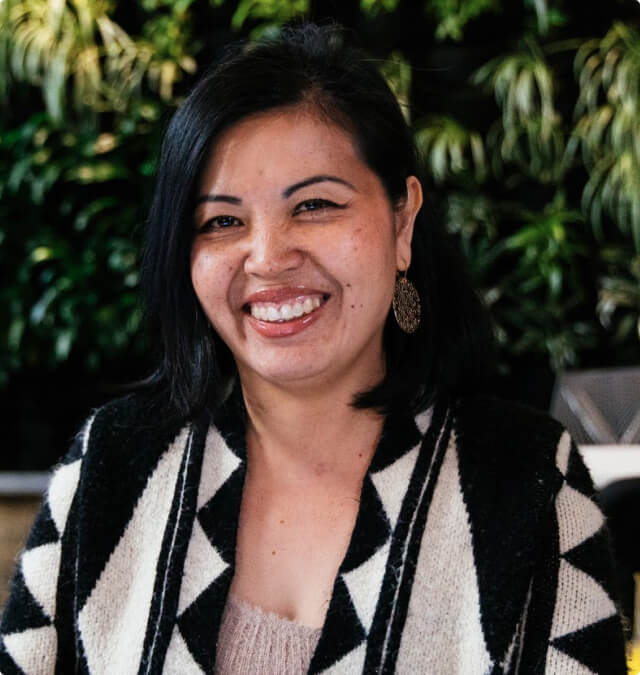
“I came to the US as a refugee from Laos when I was eight years old. I'm now fortunate to lead an organization that has served the Southeast Asian community for 46 years. Very little is known about our struggles: poverty, intergenerational trauma, lack of affordable housing, and access to the resources to thrive. We suffer in silence and become known as a model minority. But our organization is chipping away at those challenges, providing social services, job support for adults, and education and leadership development for our young people, so they're on track for college. Joining the San Francisco-Marin Food Bank's Board last year was extremely important to me, especially since 65 percent of its participants are Asian. Representation matters. You need voices with authentic lived experiences, and their ideas help bring change, like offering culturally relevant food, services, and strategies. And those insights help validate the Food Bank's work and build stronger community connections.”
― Judy Young, Executive Director, Southeast Asian Development Center; and Board Member, San Francisco-Marin Food BankNearly 240 Food Bank employees
supported our neighbours in need
Added 5 new board members, including 2
community partners
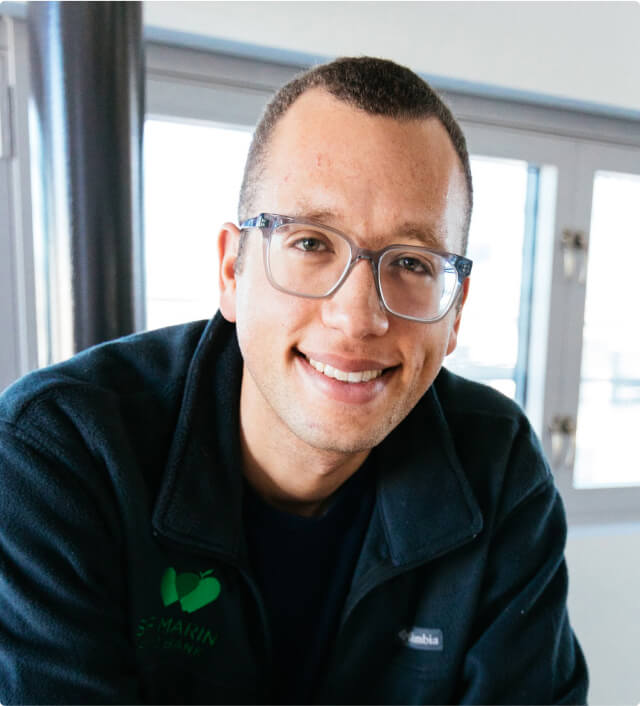
“The heart of our Analytics and Transformation department is empowering the Food Bank with data and technology to improve mission and operations, from food sourcing to long-term planning by our Board of Directors and Senior Leadership Team. In the last few years, we’ve supported the launch of financial planning tools to ensure the Food Bank’s funds are used as efficiently as possible and developed a food quality dashboard to maximize the quality of food our participants receive. We’re currently working with our Programs team to support the launch of a new system to manage relationships with our community partners. We’re also working with our Supply Chain team to launch routing technology to better plan deliveries and reduce truck emissions and fuel costs. In all parts of the organization, we’re providing new intelligence which can inform data-driven decision making at the Food Bank and bring us closer to ending hunger in San Francisco and Marin.”
― Maxwell Titsworth, Director of Analytics and Transformation, San Francisco-Marin Food Bank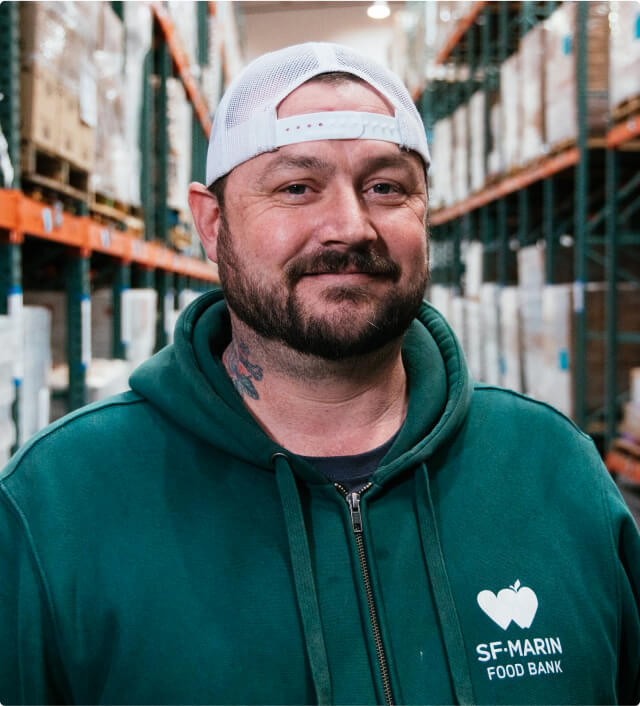
“One of the Food Bank’s long-term commitments is expanding our San Francisco warehouse, empowering us to better meet the needs of the community in a variety of ways. We nearly doubled our footprint by adding 32,000 square feet to the building and can now store more food. That includes a new cooler, which allows us to keep more produce, eggs, chicken, and other protein fresh and ready for participants. The expansion also added two new truck docks, which means we can get food out the door more quickly. And it doesn’t stop there – we’ve implemented a new warehouse management system that increases inventory accuracy and added innovative high-density racking to make the most of our floor. The new warehouse is big, it’s efficient, and we’re being smart about how we use the space – all to the benefit of our community.”
― Steve Coover, Warehouse Operations Manager, San Francisco-Marin Food Bank2 new loading docks and 32,000 square feet
of additional warehouse space
More efficient pushback racking nearly doubled the capacity of our
warehouse. We went from 1,100 spaces on our racks to 2,000+

Fiscal Year 2023

Fiscal Year 2024

Fiscal Year 2025




To truly end hunger, we cannot only address the hunger we see today, but we must tackle its root causes to create a more just and equitable society. Together with our communities, partners, participants, and supporters, we are co-creating solutions that provide food, reduce barriers, increase access, and change policies. Our three-year strategic roadmap reimagines how food insecurity is addressed, through community empowerment, increased advocacy, and focus on root causes.
Food is a basic human right. By prioritizing partnerships to drive policy change and uplift community-driven solutions, we can ensure everyone has access to nutritious food of their choosing. This year we joined the Food4All coalition to advocate for including all immigrants in California’s food assistance program. With the passage of the 2022-2023 state budget, undocumented, income-eligible adults aged 55 and older will be able to access CalFresh, making California the first state in the country to include undocumented adults in nutrition benefits. That is the type of tangible change we know is possible.
Learn more about our strategic roadmapReflecting on the Past Year
As I reflect on the past year I am inspired by the resiliency, compassion and creativity of our community. Amidst historic inflation layered on top of the residual impacts of the pandemic, neighbors across San Francisco and Marin came forward with passion and commitment to meet the moment. Together we provided healthy, quality food to 53,000 households a week (compared to 32,000 pre-pandemic), piloted new ways to implement community feedback, uplifted the voices of those with lived experience, championed equity internally and externally, and expanded our warehouse to better meet the need.
When I think about what we achieved together, I’m awe-struck. It is not the pounds of food distributed or the number of people served that inspires me. No, this work is about so much more than a bag of groceries. What truly moves me is the care and comfort we are able to provide – because food is everything. When 95 percent of our participants say they worry less about running out of food at the end of the week because of the Food Bank, that is an outcome of safety and security that is perhaps immeasurable.
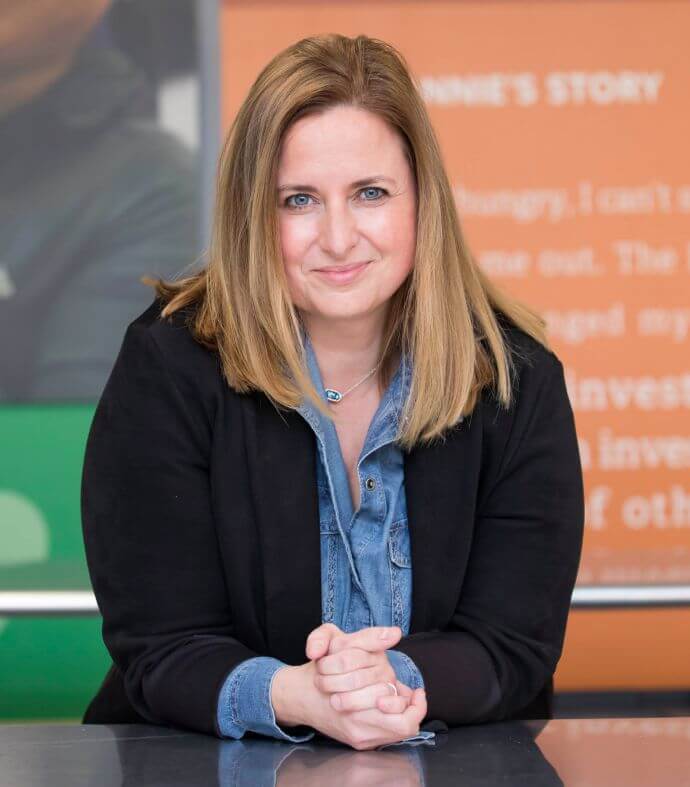
But this year was not without its challenges. COVID-19 shone a spotlight on the issue of food insecurity in our community; as that spotlight fades, hunger does not. 72 percent of Food Bank participants have yet to recover financially from the pandemic. Inflation is straining already tight budgets and more families, seniors, and other neighbors are turning to the Food Bank to make ends meet.
We are not immune to these challenges. Rising grocery prices and declining government support are driving up our expenses. While we continue to offer our community the services they need, our current situation is not sustainable. Rising costs and unplanned expenses have forced us to leverage our reserves in order to cover last year’s deficit. We anticipate a similarly challenging financial situation this fiscal year. I am grateful for the generosity our donors showed during the pandemic that made our important work possible, but we will need continued support in the years to come.
As we look forward, we are squarely focused on ending hunger in San Francisco and Marin counties. Doing so will require continuing to work together to meet these unprecedented challenges. We must continue to offer high-quality services with dignity, centering the knowledge of those with lived experience of hunger – whether in the past or present. We must work with our community to uplift solutions, drive systemic change, and tackle root causes. We must ensure critical safety nets like CalFresh remain accessible and keep up with our current economic realities.
These are bold and ambitious goals; it will not be easy. But with your continued support we can create a more just and equitable community. Together, I believe we are up to the challenge to end hunger in San Francisco and Marin.

Tanis Crosby
Executive Director

Thanks to generous support like yours, the Food Bank was able to provide
enough food for 153,000 healthy meals on average each day last year.
This totaled enough food for 55.8 million meals provided throughout the year.
Funding Breakdown
Revenue
Donated Food and In-Kind Contributions
$ 79,010,297
Government Food Commodities
$ 15,613,170
Government Grants
$ 19,088,624
Private Contributions Including Events
$ 45,123,169
Other Revenue*
$ 1,891,512
Total Revenue**
$ 156,943,748
*Other Revenue includes net investment loss of $2,277,028 related to stock market decline
**The value of donated food is included in the dollar breakdown but not the percentage breakdown
Expenses
Program Services
$ 143,256,764
Management and General
$ 3,664,427
Fundraising
$ 6,022,874
Total Expenses
$ 152,944,065
Total Net Assets***
$ 115,425,691
***This figure includes $31 million of restricted net assets related to the Food Bank’s expansion as well as food on hand as of June 30, 2022
Board of Directors
Cigdem Gencer, Chair
Executive Coach & Founder
Fazilet Consulting
Jonathan Walker PhD, Vice Chair
Managing Director
Secretariat Economists LLC
Jessica Berg
Co-Founder and Principal
BergDavis Public Affairs
Noelle Bonner
CEO
Bonner Communications
Scott Brubaker
CFO
GlobalLogic Inc.
Dianna Cavagnaro
COO
Ideas Events & Rentals
Jennifer Chang
Senior Director of Program Management
Zendesk
Pepe Gonzalez
Principal
Laurel Dell, Short Elementary Schools
Randy Gottfried
Finance Consultant
Ansaf Kareem
Partner
Lightspeed Venture Partners
Horace L. Montgomery Jr.
Interim Associate Executive Director of Programs
Associated Students at SF State University
Rabbi Stephen S. Pearce, PhD
Congregation Emanu-El
San Francisco
Nadia Rahman
Principal
Rahman Consulting
Barbara Rosston
Nonprofit and Educational Consultant
Beth Roy Jenkyn
Pro-Bono Nonprofit Consultant
Community Volunteer
Dr. Joseph Sáenz
Managing Director
Fremont Group
Jeffrey Schoppert
Retired Lawyer
Hilary Seligman, MD
Professor of Medicine
UCSF
Tara Seracka
Senior Vice President, Legal & Deputy General Counsel
Cisco Systems
Linda Shiue, MD
Director of Culinary Medicine
Kaiser Permanente SF
Uma Sinha, PhD
Chief Scientific Officer
BridgeBio Pharma
Judy Young
ED
Southeast Asian Development Center
onto
2023
Get Food Bank Updates
Privacy & Cookies: This site uses cookies. By continuing to use this website, you agree to their use. To find out more, including how to control cookies, see our Privacy Policy here.
